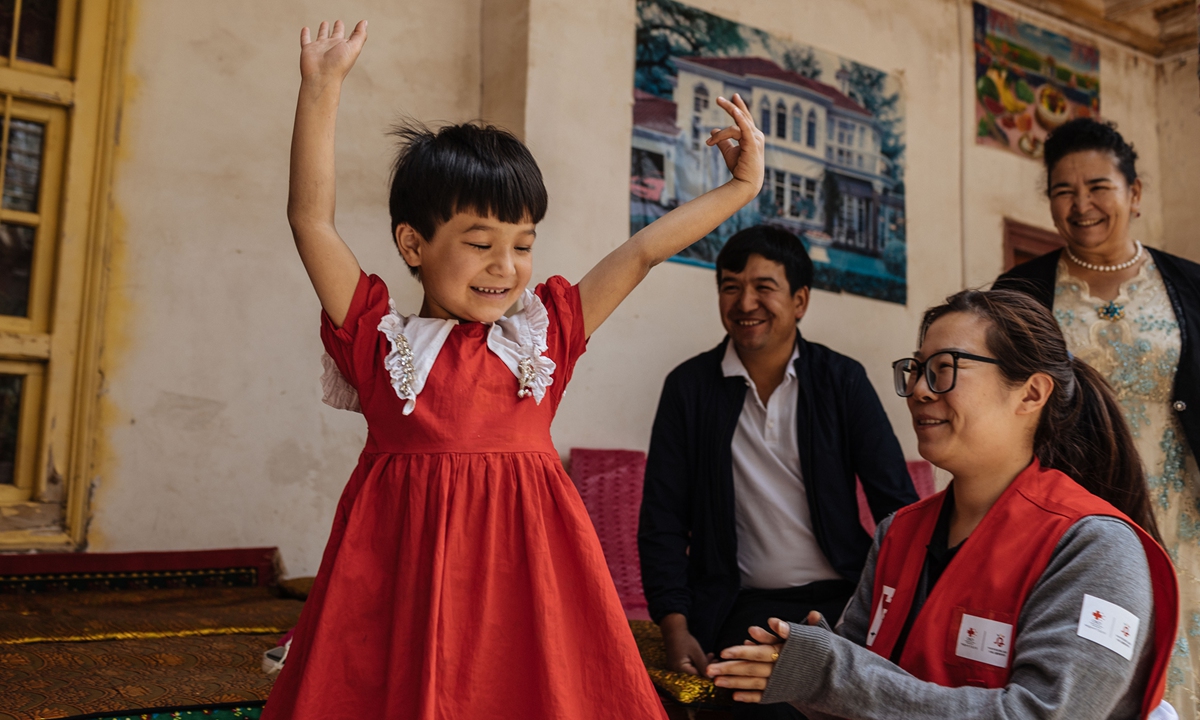What additional support and care can be given to one of the most vulnerable groups on China’s frontiers? In Northwest China’s Xinjiang Uygur Autonomous Region, the “Journey for Angel – Xinjiang Congenital Heart Disease Screening and Assistance Action” event by the Chinese Red Cross Foundation (CRCF), along with medical teams from Eastern China, extends a warm arm.
Traveling thousands of miles to the westernmost tip of the Chinese territory, they are one of the most anticipated special visitors for local children, parents, and doctors on the Pamir plateau.
To help more children with congenital heart disease receive treatment and help support rural revitalization, from May 10 to 21, the CRCF led medical teams travel from Shanghai and East China’s Jiangsu Province to places including Tumxuk, Kashi, and Aksu prefectures in the Xinjiang region to conduct screenings and consultations, and provide free treatment for children with congenital heart disease who meet the assistance criteria.
Thanks to the promotion and strong support from local authorities, this public welfare action has gained positive recognition and participation from local parents and children. The care brought by the doctors has earned smiles from the people there.
Moreover, the medical teams have also introduced advanced treatment technologies and concepts to the region, helping to train more medical professionals and enabling local people to experience the convenience brought about by Chinese medical development.
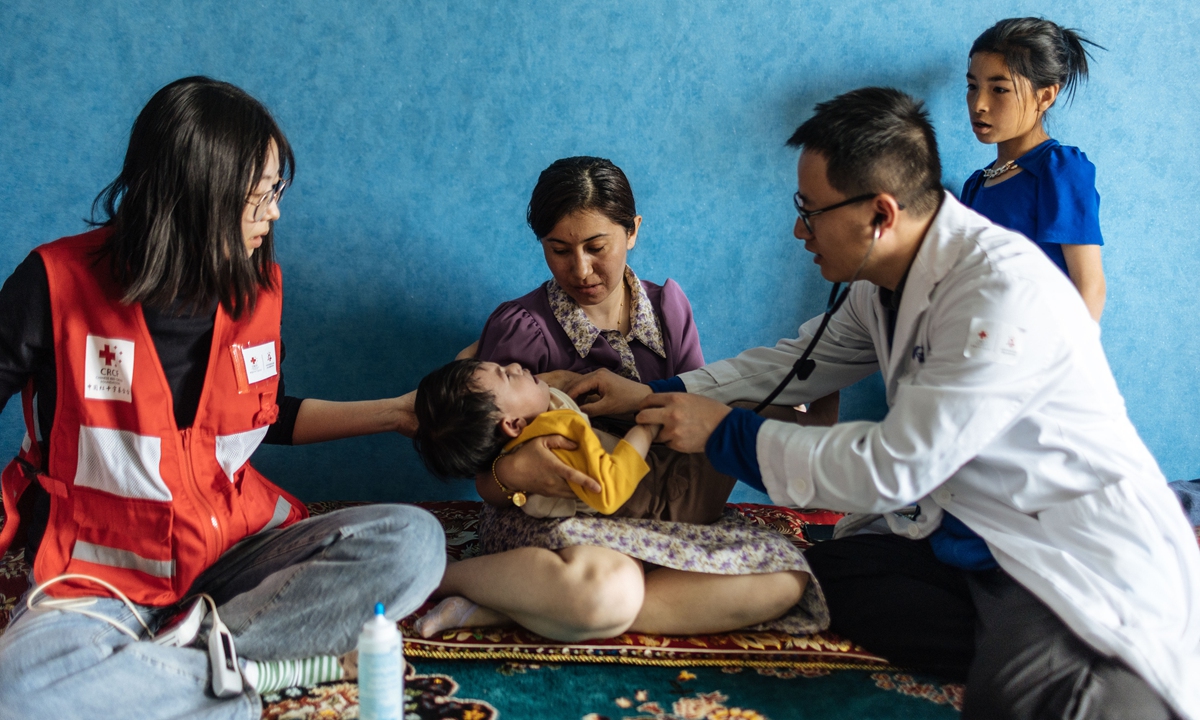
A doctor (right) performs a routine checkup on a child who received surgery during a home visit in Jiashi county on May 12, 2023. Photo: Li Hao/GT
Healer with a soft heart
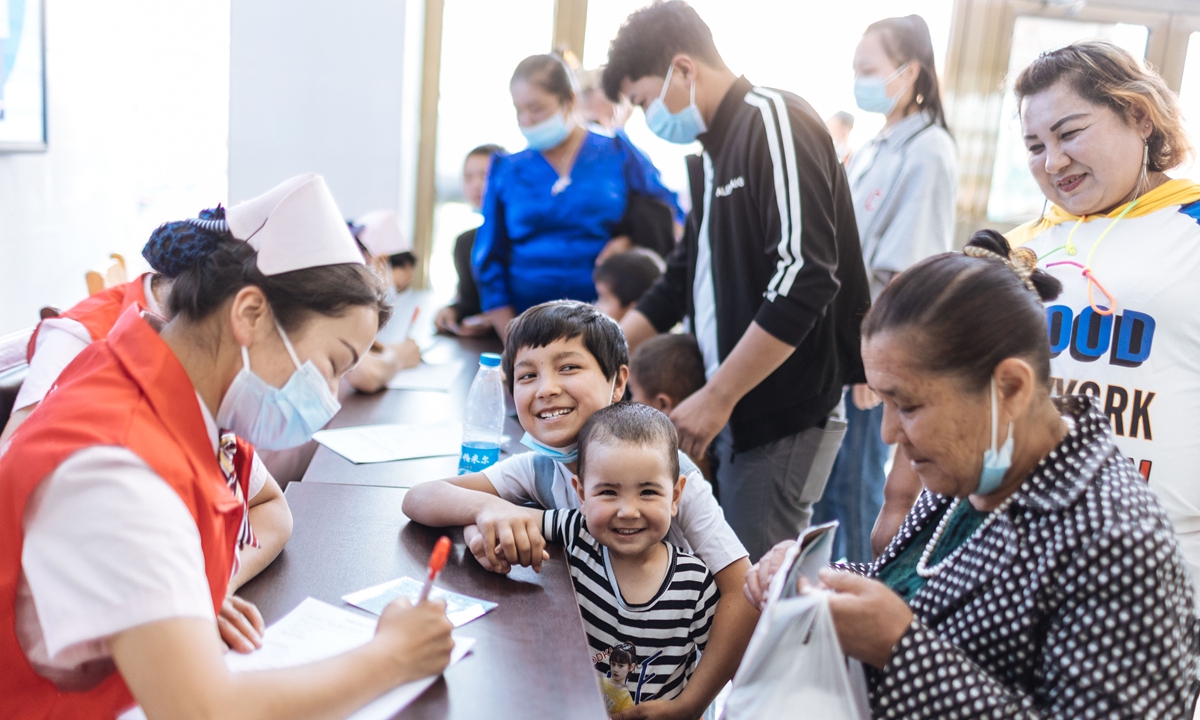
Parents and children happily register for pre-screening in a hospital in Jiashi county, on May 12, 2023.
Holding his 13-year-old younger brother Ekber (pseudonym) on one hand with another one holding a pennant, 23-year-old Ezimet (pseudonym) came early the Jiashi County Zongkang Hospital and joined the growing queue on May 15.
Unlike the apprehension they felt when they first came for their screening in July 2022, this time their hearts were filled with affirmation and gratitude.
“You changed your hairstyle!” As soon as they enter the ultrasound room, Ezimet greeted the doctors from the Shanghai DeltaHealth Hospital with familiarity and hugs them.
In 2022, Ezimet and Ekber were both diagnosed with Marfan syndrome, a rare heart condition. Fortunately, with the help of the CRCF, they were able to undergo free surgery.
In February, Ezimet went to Shanghai, and left a deep impression on the doctors because of his extreme nervousness before the operation.
It was the first time the brothers had left home. Ezimet has three siblings, and only his older brother does not carry the Marfan syndrome gene, making him the only pillar of the family.
It is gratifying that the doctors at the DeltaHealth Hospital treated Ezimet as a friend and talked to him from time to time to relieve his stress.
Three months later, how nervous he was in Shanghai’s inpatient ward is in the distant past, and now he is overjoyed to see the doctor in Xinjiang again.
After the review, Ezimet couldn’t wait to share with the doctor that his brother will soon return to school, and that he is also actively looking for a job. This young man is eager to earn money to alleviate the financial pressure from his family, and “then go to Shanghai to look for my friends with Xinjiang souvenirs.”
“Do you attend physical education classes? What do you do in the classes?” During the screening and consultation process, the doctors often touched the faces of children who feel uneasy and communicate with them in a conversational tone, followed by a careful examination and professional advice and guidance.
“Currently, most congenital heart diseases are curable in China, and we hope that with our efforts, more children can come out of the shadow of heart disease before school age, have normal vaccinations and physical education classes, and have the same happy childhood as other children,” Liu Jianshi, the director of the Department of Surgery at the DeltaHealth Hospital, who had already participated in three medical screening missions in Xinjiang, told the Global Times.
During this year’s screening activities, two medical teams screened 2,632 children, of whom 321 were eligible for surgery. These children will be assisted by public welfare projects such as the central government’s special lottery ticket public welfare fund, to go to Shanghai and Wuxi for surgery at no personal expense.
In 2012, the CRCF launched the “Journey for Angel – please discover the hope of Life” volunteer service initiative, calling on all sectors of society to care for the most vulnerable people, cooperating with professional medical institutions to proactively identify the need for assistance. By the end of 2022, more than 23,000 children suffering from various conditions had been helped.
“This is my second time coming to Xinjiang and I’ve seen many familiar faces. It is gratifying that they have recovered well,” said Wang Liqin, a pediatrician at DeltaHealth Hospital. “we will be responsible for treating them until they got recovered.”
Live up to expectations
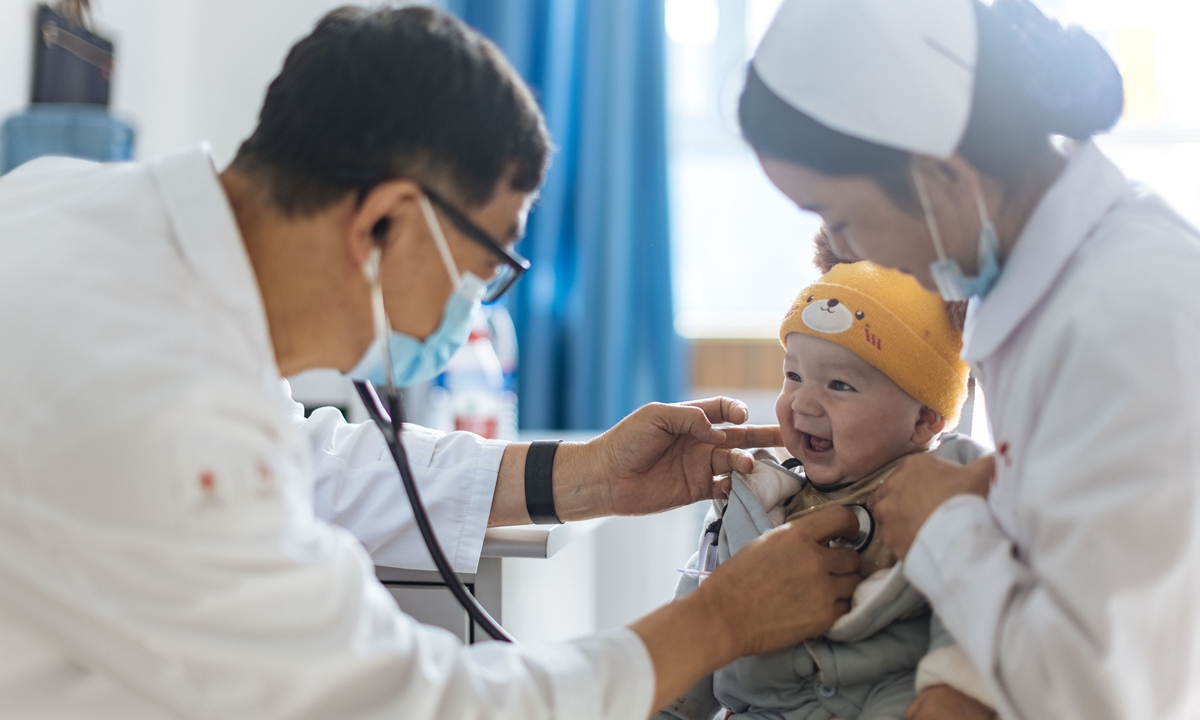
Doctor Liu Jianshi (left) performs auscultation screening on a child in Yuepuhu county on May 13, 2023. Photo:Li Hao/GT
Amina (pseudonym), an 8-year-old girl from Baren town, specially wore a bright red dress to welcome the doctors who came to visit her after her successful heart surgery.
In 2022, as advised by local village doctor, Amina attended the screening organized by the CRCF and was diagnosed with an atrial septal defect. She was hospitalized in Shanghai for 10 days in February for surgery and has since made a full recovery.
Her parents, who work as a part-time electric bike salesman and a beautician, respectively, earn a total monthly income of about 4,000 yuan ($500), making the more than 50,000-yuan surgery fee a heavy burden for them.
However, to their surprise, all they needed to do was stay in touch with the CRCF and bring their medical insurance card to the hospital. The local CRCF staff members helped them with the referral process and arranged everything for Amina’s trip.
The village doctor, Ayimiguli Rouzi, who is responsible for providing basic public health services in Baren town, felt proud of the introduction of such a public health project that has helped Amina and other families in need.
Currently, the Xinjiang region has gradually established a huge team of rural doctors, who provide effective, convenient, and accessible basic medical and health services, and promote a more proactive awareness of medical treatment among local people.
Ayimiguli was pleased to see that many families who went to Shanghai for surgery along with Amina have become friends and formed a united force to encourage more people to respond positively to the goodwill.
With the help of a lot of public welfare organizations, the fear of treating diseases among Xinjiang’s residents due to economic difficulties and inadequate medical conditions has been greatly alleviated.
“In 2022, during our journey, there were, on occasion in some hospitals, children who came for the check-up but they were fewer than expected, but this year, at every screening point, there have been more children than estimated. When communicating with the parents, we can feel that they attach more importance to their children’s health,” said Wang.
Among the people who came to the screening event, there were herdsmen who came by chartered bus from a couple of hundred kilometers away. There were children who stood in a standard military posture when they saw their doctor and gave a military salute at the end of the examination. There were even parents who still have their boarding pass to fly to Shanghai for surgery in a thick pile of cases for review.
Visiting 12 county hospitals in 12 days, the medical team’s screening schedule was very tight. Whenever the team’s minibus entered a hospital for screening, Liu would remind the team that the more people came for the check-up and the busier they are likely to be, and the more seriously they should take their work, not to disappoint the local people’s expectations.
Building ‘non-removable’ medical teams
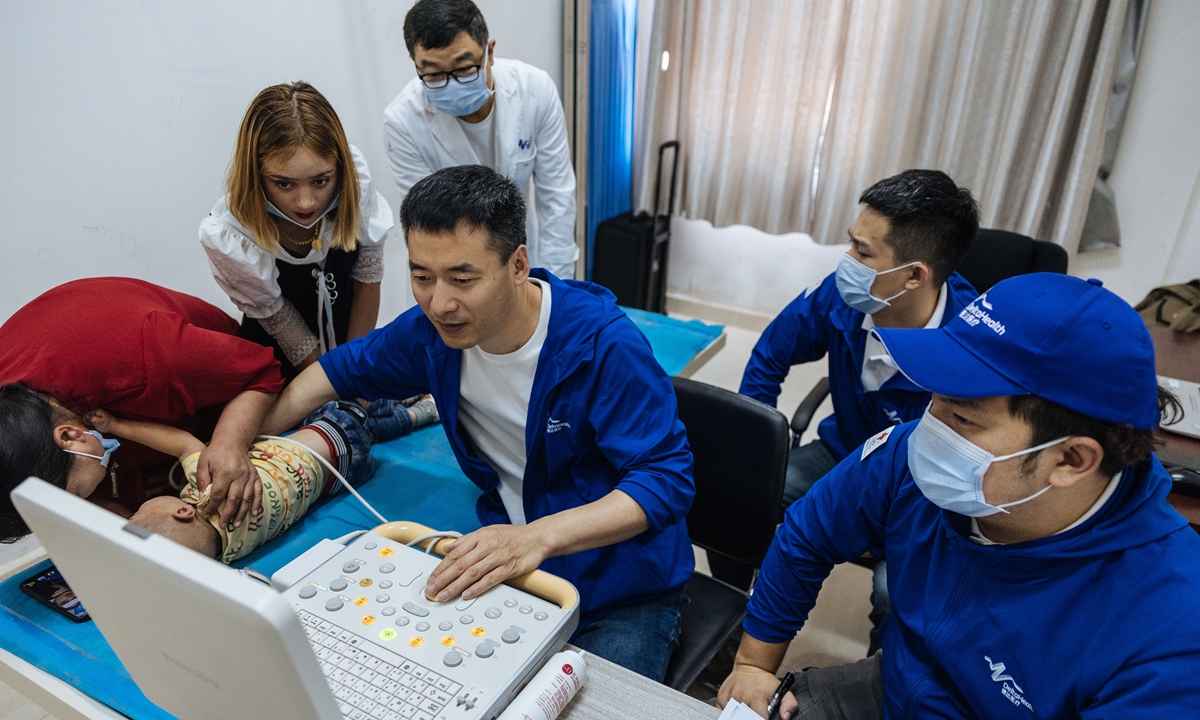
A medical team from the Shanghai DeltaHealth Hospital performs an ultrasound examination on a child in Shache county on May 15, 2023. Photo:Li Hao/GT
“Currently in the Xinjiang region, awareness and treatment of congenital heart disease have been improving, resulting in more children participating in screening programs. However, the number of children requiring surgery has decreased while the number of follow-up visits has increased. This indicates that our efforts have been effective,” Chen Yuxi, a project officer for the CRCF’s Life and Education Program Office, told the Global Times.
But Chen and the medical team not only feel a sense of achievement in helping more sick children, but also in promoting and witnessing the collaboration between aid teams and local hospitals, which has helped to train more medical personnel and improve the quality of medical services and management in the assisted areas.
Having conducted pro bono medical screenings in remote areas such as Xinjiang and Southwest China’s Yunnan and Guizhou provinces in recent years, Liu observed that China has made tremendous efforts to improve medical conditions in once-poor areas.
“Most of the remote areas that we’ve traveled to have advanced, fully equipped general county hospitals,” Liu said. “The hardware facilities are in place, and the next effort is in the development of a more professional workforce.”
In every county the medical team visited in Xinjiang, the local health committee would send officials to communicate with the team, and pediatricians from the hospital where the screening site was located competed to be the team’s Uygur language translators, expecting to learn more from them.
Currently, DeltaHealth Hospital has established a partnership with the Kashi Prefecture Second People’s Hospital. Doctors in Kashi are regularly sent to Shanghai for further training. “Such cooperation leaves behind a ‘non-removable’ professional medical team here,” said Liu.
According to China’ s National Health Commission, under the support of hospitals and experts from all over the country, as of 2022, patients in the region are receiving comprehensive treatment for common and chronic diseases, and 50 percent of local county hospitals can perform complex surgeries such as the extraction oof brain tumors, cervical spine repair, and endoscopic treatment that were previously unavailable.
With the care poured in by the whole community, the work of public welfare organizations and medical staff in Xinjiang region is more motivated, and resonates with healthier and stronger heartbeats of local children.
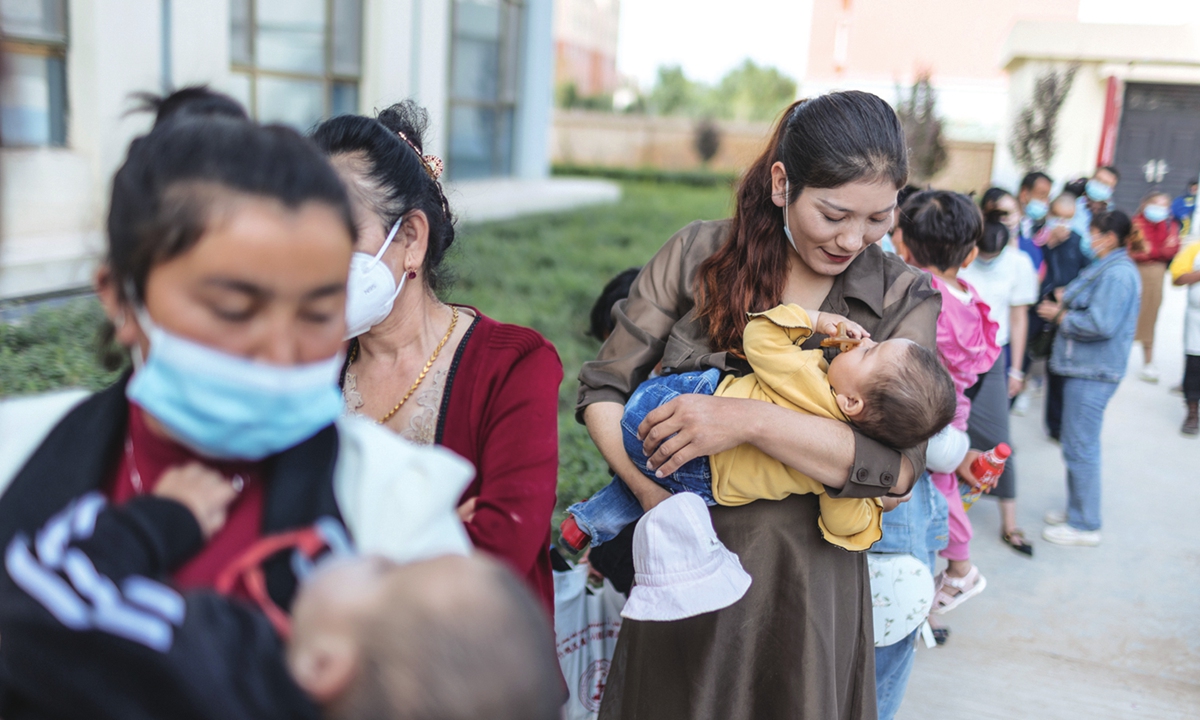
Parents hold their children as they wait for screening outside a hospital in Jiashi county on May 12, 2023. Photo: Li Hao/GT




